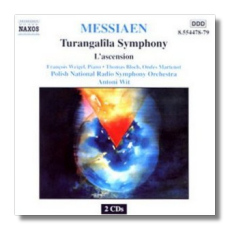
The Internet's Premier Classical Music Source
Related Links
- Messiaen Reviews
- Latest Reviews
- More Reviews
-
By Composer
-
Collections
DVD & Blu-ray
Books
Concert Reviews
Articles/Interviews
Software
Audio
Search Amazon
Recommended Links
Site News
 CD Review
CD Review
Olivier Messiaen

Turangalîla
- Turangalîla Symphony
- L'ascension
François Weigel, piano
Thomas Bloch, ondes Martenot
Polish National Radio Symphony Orchestra/Antoni Wit
Naxos 8.554478/79 DDD 2CDs: 54:54, 52:32
I can remember when Turangalîla was a rarity, and when everyone got the RCA Victor LPs from 1968 of Seiji Ozawa conducting the Toronto Symphony. Since then, there have been several excellent recordings of the work, and Ozawa's performance no longer seems as special as it once did. That's life!
This new Naxos recording, taped in Poland in 1998, makes a super-budget label Turangalîla available to consumers. This benefit is partly offset by the need to spread the work onto two CDs. Wit's total timing for the symphony is 80:45, which some labels have shown is not too long for a single disc. Looking at the competition, Myung-When Chung's Deutsche Grammophon recording of the work handily fits on one full-priced CD, as does Riccardo Chailly's version for London. André Previn's needs two discs, but EMI is selling the two for the price of one in their Double Fforte series (and there are two substantial "fillers" by Poulenc). Naxos, then, comes under the wire as being less expensive than any of these, but not by the label's usual wide margin.
Fortunately, Wit and friends are very satisfying in both of these works. Wit is not as exuberant as Chung, for example, and his orchestra doesn't always play with the lack of self-consciousness that would suggest the musicians' absolute technical mastery of Messiaen's difficult (at least for its time) idiom; while they are not precisely cautious, they're not uninhibited either. The upside of this is that Wit's care and lack of haste keep the composer's textures unclogged; this is a recording to consider if you wish to analyze the score in addition to luxuriating in it. Furthermore, in the slow movements, it is as tender as anyone else's, yet free from sentimentality. These virtues also inform L'ascension. The opening brass chorale is not played with the certainty of faith, but with the incense of mystery. Again, although there are more spectacular readings of this score than Wit's, this recording earns its place at the table with its thoughtfulness.
Thomas Bloch studied the ondes Martenot with Jeanne Loriod, who probably has played Turangalîla more than any other performer. His instrument doesn't have the nicely rounded tone found on some other recordings, but it does get heard over the thick orchestration. Pianist Weigel is expert but not overly assertive, in keeping with the overall tone of this recording.
The engineering and booklet notes are excellent. Wit and the PNRSO again show why they are considered to be experts in playing orchestral scores from the 20th century. And if you don't know this marvelously exciting score – not at all forbidding, in spite of its length – here's your chance.
Copyright © 2001, Raymond Tuttle


















